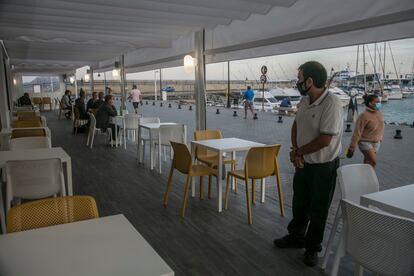Spain’s Canary Islands will let foreign visitors enter with an antigen test
Regional authorities bypass the central government’s requirement for a negative PCR test

The regional government of Spain’s Canary Islands announced on Wednesday that it would pass a decree allowing tourists to enter the territory with a negative antigen coronavirus test, which is relatively cheap and can be obtained quickly, rather than a PCR test, which is more expensive and takes longer for results to be obtained.
The plan was announced last week after a Cabinet meeting and is due to come into force today, Thursday. The scheme breaches requirements by the central Health Ministry in Madrid, which established the need for a negative PCR test on November 23. The regional government said it will take charge of controlling international arrivals in the archipelago, using the perimetral closure of the islands as a legal basis for doing so.
The regional government said it would pay for PCR or antigen tests for Canarian residents returning to the islands to spend the Christmas holiday
Sealing regional borders is permitted under the state of alarm that is currently in force, and which gives the country’s regions greater powers to restrict movement during the ongoing coronavirus crisis. In this case, however, the legal recourse will be used to facilitate access to the islands, which are just beginning their tourism high season, rather than to restrict it.
The requirement for travelers to present a negative PCR test when entering Spanish territory has been a controversial one, given the high cost of such a procedure, in particular for families who are traveling, as well as the difficulty of securing a test and the results in the 72-hour time frame stipulated by the Spanish government.
On Wednesday, the Health Ministry announced it would be accepting so-called TMA tests, which are marginally cheaper and faster, as well as PCRs, and also exempted children aged under six from having to supply any kind of test result on arrival in Spain. The ministry is not, however, considering allowing antigen tests for the moment. Until now, travelers coming from the rest of Spain to the Canary Islands have been allowed to present an antigen test rather than a PCR.
Speaking last Thursday at a press conference, the Canary Islands’ government spokesperson Julio Pérez sought to avoid any controversy over the decision to allow antigen tests, despite the decree “contradicting” the state requirements for PCR results. “The Canarian government is maintaining negotiations in the framework of open understanding with the Health Ministry to harmonize the regional rules with the national ones,” stated the press release about the new measure.
The Spanish government is not currently considering letting international travelers come in with an antigen test
The region said it believes that the “pioneering system put in place by the Canarian government has proven to be trustworthy,” given that in the last five weeks, “during which around 250,000 travelers have arrived on the islands, there have been very few cases of tourists who were positive.” The system referred to is the requirement for visitors to also present a negative antigen or PCR test before they can take up their accommodation while on the islands.
Sources from the regional government added that the decree, “which establishes the perimetral closure of the region, does not cut off travelers’ access to the same, but rather regulates their safe entry with systems that are accessible and affordable.”
Last Thursday, the regional government also announced that it would pay for PCR or antigen tests – preferably in the point of origin – for Canarian residents who were returning to the islands to spend the Christmas holiday there. The measure, the region stated, aimed to “provide the greatest safety and thus protect relatives and the population” of the region. “We want students to return, but having been tested, thus minimizing the risk of infection. These measures do not relieve them of complying with the rest of the rules, such as safe distances, etc.” the spokesperson pointed out.
English version by Simon Hunter.
Tu suscripción se está usando en otro dispositivo
¿Quieres añadir otro usuario a tu suscripción?
Si continúas leyendo en este dispositivo, no se podrá leer en el otro.
FlechaTu suscripción se está usando en otro dispositivo y solo puedes acceder a EL PAÍS desde un dispositivo a la vez.
Si quieres compartir tu cuenta, cambia tu suscripción a la modalidad Premium, así podrás añadir otro usuario. Cada uno accederá con su propia cuenta de email, lo que os permitirá personalizar vuestra experiencia en EL PAÍS.
¿Tienes una suscripción de empresa? Accede aquí para contratar más cuentas.
En el caso de no saber quién está usando tu cuenta, te recomendamos cambiar tu contraseña aquí.
Si decides continuar compartiendo tu cuenta, este mensaje se mostrará en tu dispositivo y en el de la otra persona que está usando tu cuenta de forma indefinida, afectando a tu experiencia de lectura. Puedes consultar aquí los términos y condiciones de la suscripción digital.








































